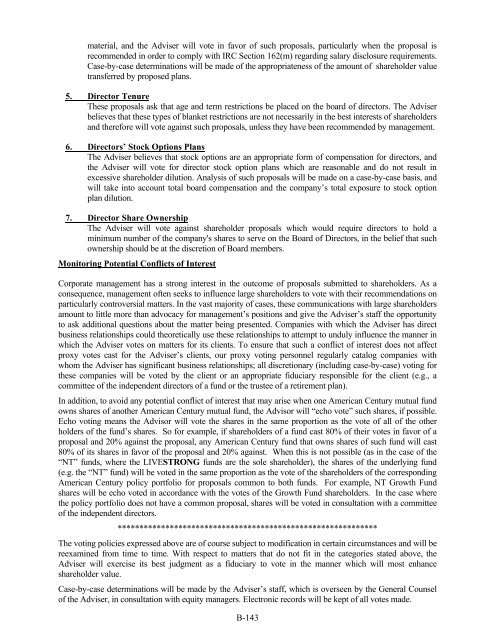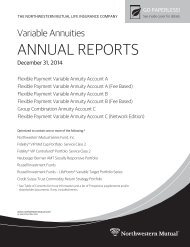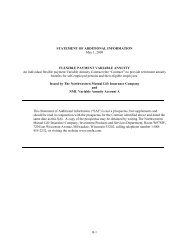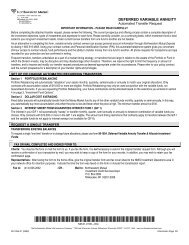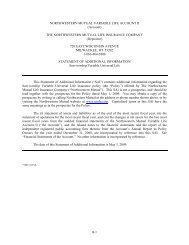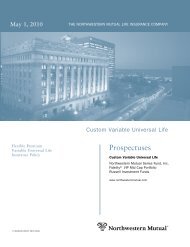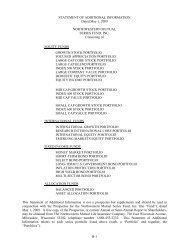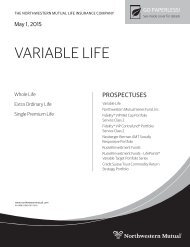B-1 STATEMENT OF ADDITIONAL INFORMATION Dated May 1 ...
B-1 STATEMENT OF ADDITIONAL INFORMATION Dated May 1 ...
B-1 STATEMENT OF ADDITIONAL INFORMATION Dated May 1 ...
Create successful ePaper yourself
Turn your PDF publications into a flip-book with our unique Google optimized e-Paper software.
material, and the Adviser will vote in favor of such proposals, particularly when the proposal isrecommended in order to comply with IRC Section 162(m) regarding salary disclosure requirements.Case-by-case determinations will be made of the appropriateness of the amount of shareholder valuetransferred by proposed plans.5. Director TenureThese proposals ask that age and term restrictions be placed on the board of directors. The Adviserbelieves that these types of blanket restrictions are not necessarily in the best interests of shareholdersand therefore will vote against such proposals, unless they have been recommended by management.6. Directors’ Stock Options PlansThe Adviser believes that stock options are an appropriate form of compensation for directors, andthe Adviser will vote for director stock option plans which are reasonable and do not result inexcessive shareholder dilution. Analysis of such proposals will be made on a case-by-case basis, andwill take into account total board compensation and the company’s total exposure to stock optionplan dilution.7. Director Share OwnershipThe Adviser will vote against shareholder proposals which would require directors to hold aminimum number of the company's shares to serve on the Board of Directors, in the belief that suchownership should be at the discretion of Board members.Monitoring Potential Conflicts of InterestCorporate management has a strong interest in the outcome of proposals submitted to shareholders. As aconsequence, management often seeks to influence large shareholders to vote with their recommendations onparticularly controversial matters. In the vast majority of cases, these communications with large shareholdersamount to little more than advocacy for management’s positions and give the Adviser’s staff the opportunityto ask additional questions about the matter being presented. Companies with which the Adviser has directbusiness relationships could theoretically use these relationships to attempt to unduly influence the manner inwhich the Adviser votes on matters for its clients. To ensure that such a conflict of interest does not affectproxy votes cast for the Adviser’s clients, our proxy voting personnel regularly catalog companies withwhom the Adviser has significant business relationships; all discretionary (including case-by-case) voting forthese companies will be voted by the client or an appropriate fiduciary responsible for the client (e.g., acommittee of the independent directors of a fund or the trustee of a retirement plan).In addition, to avoid any potential conflict of interest that may arise when one American Century mutual fundowns shares of another American Century mutual fund, the Advisor will “echo vote” such shares, if possible.Echo voting means the Advisor will vote the shares in the same proportion as the vote of all of the otherholders of the fund’s shares. So for example, if shareholders of a fund cast 80% of their votes in favor of aproposal and 20% against the proposal, any American Century fund that owns shares of such fund will cast80% of its shares in favor of the proposal and 20% against. When this is not possible (as in the case of the“NT” funds, where the LIVESTRONG funds are the sole shareholder), the shares of the underlying fund(e.g. the “NT” fund) will be voted in the same proportion as the vote of the shareholders of the correspondingAmerican Century policy portfolio for proposals common to both funds. For example, NT Growth Fundshares will be echo voted in accordance with the votes of the Growth Fund shareholders. In the case wherethe policy portfolio does not have a common proposal, shares will be voted in consultation with a committeeof the independent directors.************************************************************The voting policies expressed above are of course subject to modification in certain circumstances and will bereexamined from time to time. With respect to matters that do not fit in the categories stated above, theAdviser will exercise its best judgment as a fiduciary to vote in the manner which will most enhanceshareholder value.Case-by-case determinations will be made by the Adviser’s staff, which is overseen by the General Counselof the Adviser, in consultation with equity managers. Electronic records will be kept of all votes made.B-143


